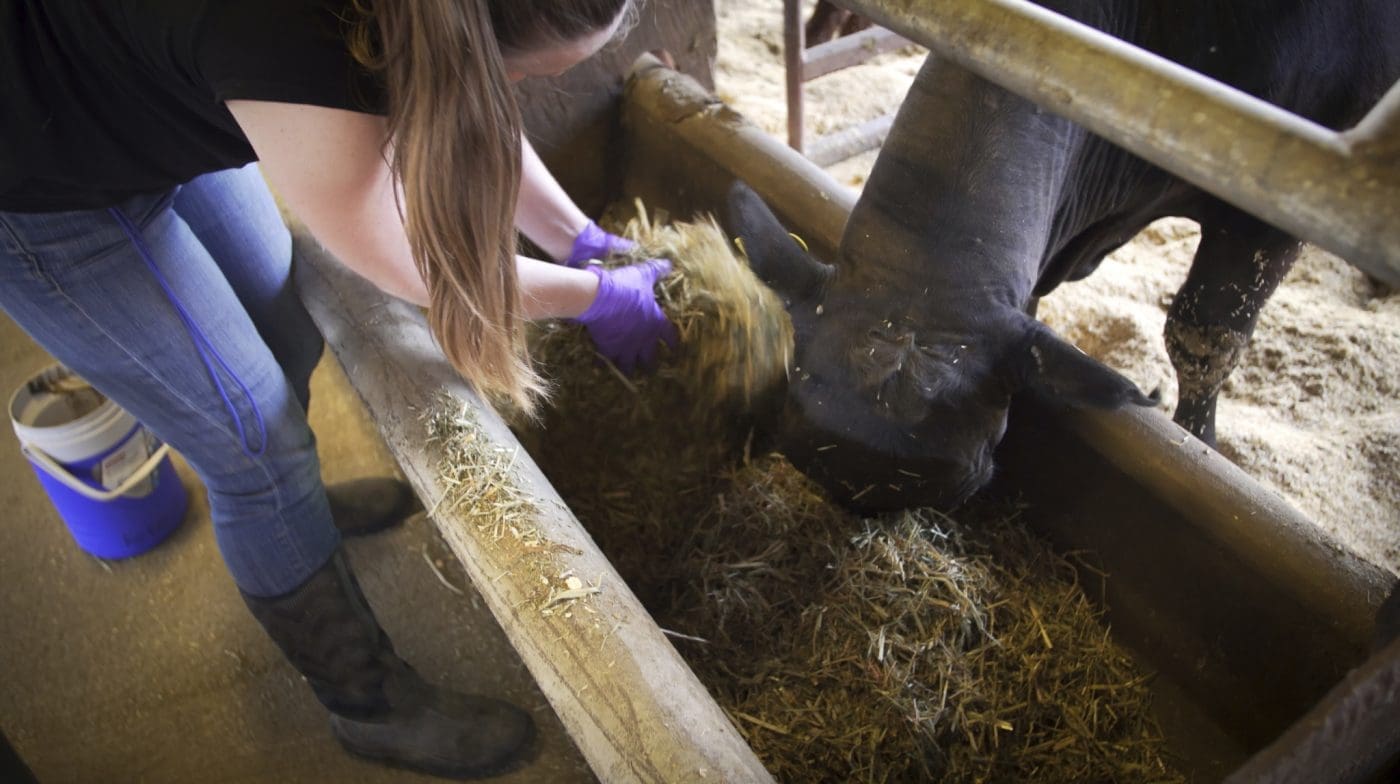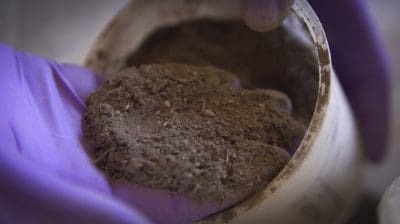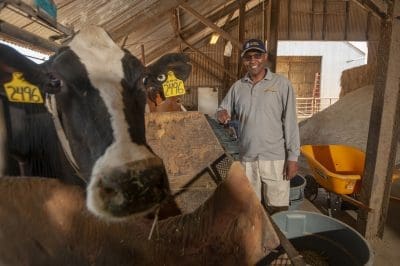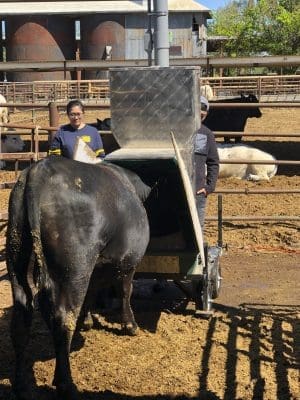
Breanna Roque, Ph.D.graduatestudent with the UC Davis Department of Animal Science, feeds these steersat the UC Davis beef barn a small amount of seaweed mixed in with their feed. (Timothy McConville/UC Davis)
SUPPLEMENTING the diet of beef cattle with red seaweed can more than halve methane emissions without compromising meat quality, according to the results of a US study published overnight in the open-access journal PLOS ONE.

This red seaweed, asparagopsis taxiformis, was mixed with the steer’s normal feed in order to reduce methane emissions from the cattle. (Timothy McConville/UC Davis)
Breanna Roque from the University of California, Davis, and her fellow researchers fed twenty-one Angus-Hereford beef bullocks their usual diet of hay, grains, and corn, supplemented with either zero, low, or high concentrations of red seaweed (Asparagopsis taxiformis).
They measured the quantity of methane, hydrogen, and carbon dioxide released by individual bullocks periodically for 21 weeks and found that seaweed supplements reduced methane emissions by between 45 percent and 68 percent.
The proportion of forage in the base diet also influenced emissions; the greatest reductions were found with a high seaweed-supplemented, low-forage diet, which reduced methane production by as much as 80 percent. Professional grading and consumer testing revealed no effect on the quality or flavour of the meat.
The study is the first to show a sustained reduction in cattle greenhouse gas emissions as a result of feed supplementation.
Bullocks also sustained normal growth rates while consuming less food, suggesting that red seaweed supplemented diets could help farmers improve efficiency, reduce costs, and reduce methane emissions simultaneously, the authors say.
“There is more work to be done, but we are very encouraged by these results,” Roque said. “We now have a clear answer to the question of whether seaweed supplements can sustainably reduce livestock methane emissions and its long-term effectiveness.”
“We now have sound evidence that seaweed in cattle diet is effective at reducing greenhouse gases and that the efficacy does not diminish over time,” said Ermias Kebreab, professor and Sesnon Endowed Chair of the Department of Animal Science and director of the World Food Center.

Professor Ermias Kebreab with the UC Davis Department of Animal Science hasconductedresearch with dairy cows and found that feeding them seaweed will reduce methane emissions. (Greg Urquiaga)
Kebreab conducted the study along with his Ph.D. graduate student Breanna Roque.
Over the course of five months last summer, Kebreab and Roque added scant amounts of seaweed to the diet of 21 beef cattle and tracked their weight gain and methane emissions. Cattle that consumed doses of about 80 grams (3 ounces) of seaweed gained as much weight as their herd mates while burping out 82 percent less methane into the atmosphere. Kebreab and Roque are building on their earlier work with dairy cattle, which was the world’s first experiment reported that used seaweed in cattle.
In 2018, Kebreab and Roque were able to reduce methane emissions from dairy cows by over 50 percent by supplementing their diet with seaweed for two weeks. The seaweed inhibits an enzyme in the cow’s digestive system that contributes to methane production.
In the new study, Kebreab and Roque tested whether those reductions were sustainable over time by feeding cows a touch of seaweed every day for five months, from the time they were young on the range through their later days on the feed lot.
Four times a day, the cows ate a snack from an open-air contraption that measured the methane in their breath. The results were clear. Cattle that consumed seaweed emitted much less methane, and there was no drop-off in efficacy over time.
Next steps
Results from a taste-test panel found no differences in the flavour of the beef from seaweed-fed steers compared with a control group. Similar tests with dairy cattle showed that seaweed had no impact on the taste of milk.

An open-air contraption measures the methane in the cattle’sbreath as they eat. The research has found a small amount of seaweed can dramatically reduce enteric methane emissions. (Breanna Roque/UC Davis)
Also, scientists are studying ways to farm the type of seaweed — Asparagopsis taxiformis — that Kebreab’s team used in the tests. There is not enough of it in the wild for broad application.
Another challenge: How do cattle producers provide seaweed supplements to grazing cattle on the open range? That’s the subject of Kebreab’s next study.
Kebreab and Roque collaborated with research organisations in Australia including the Commonwealth Scientific and Industrial Research Organization, James Cook University in Australia, Meat and Livestock Australia, and Blue Ocean Barns, a startup company that sources, processes, markets and certifies seaweed-based additives to cattle feed. Kebreab is a scientific adviser to Blue Ocean Barns.
“There is more work to be done, but we are very encouraged by these results,” Roque said.
“We now have a clear answer to the question of whether seaweed supplements can sustainably reduce livestock methane emissions and its long term effectiveness.”
More details can be found on PLoS ONE at this link
